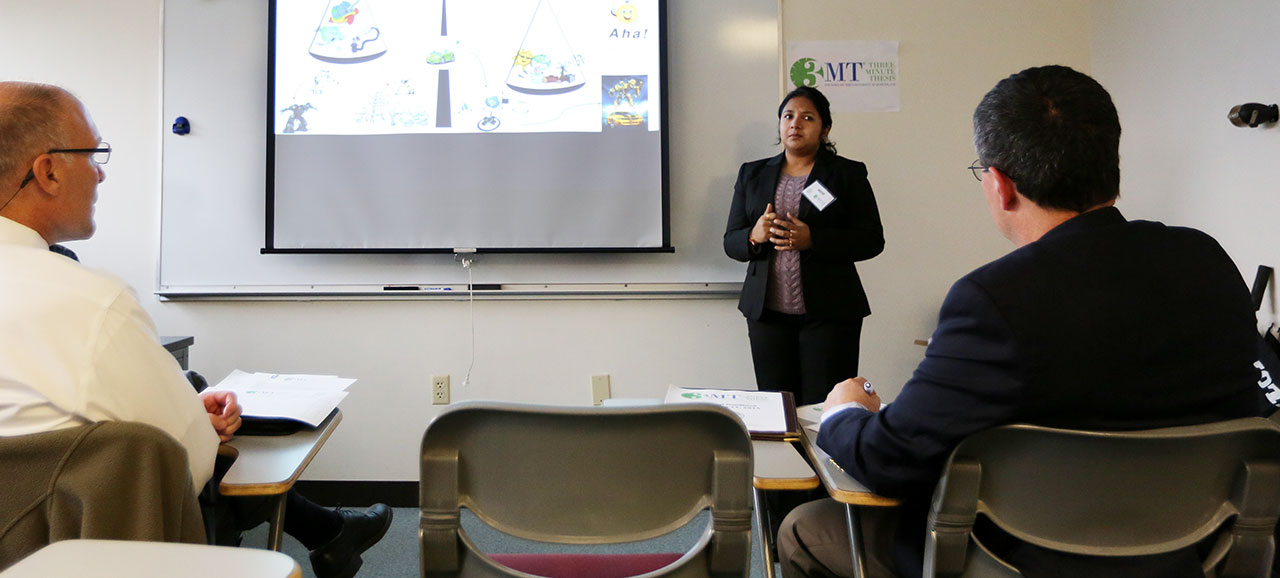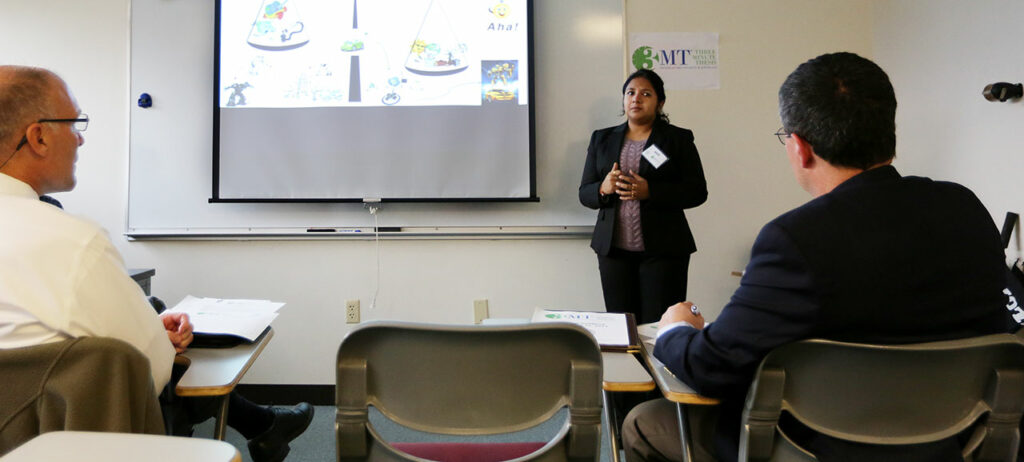Pitch perfect
Posted by Greg Katski

Maigha, a Ph.D. student in electrical engineering and winner of S&T’s 3MT competition, presents her research on electric vehicles during the first day of competition. Sam O’Keefe/Missouri S&T

Maigha, a Ph.D. student in electrical engineering and winner of S&T’s 3MT competition, presents her research on electric vehicles during the first day of competition. Sam O’Keefe/Missouri S&T
Imagine being asked to condense years of complicated research into a three-minute pitch with a single slide as a visual aid. That’s the premise of Three Minute Thesis (3MT).
Missouri S&T hosted its first-ever 3MT competition Nov. 16-17, 2015. Over 40 graduate students participated in the two-day, three-round competition, which was organized and sponsored by Dr. Venkat Allada and the office of graduate studies. Participants were expected to summarize their research in less than three minutes – they were disqualified if they went long. A panel of judges scored their presentations. The judges, who differed in each presenting room every round, came from “all different walks of life,” according to Allada, and included S&T faculty, staff and administration, as well as prominent members of the Rolla community.
Allada, vice provost for graduate studies at S&T, says the competition provided vital real-world communication experience for research students.
“This competition is very important to a STEM-type institution because sometimes we have students that go so deep into their research that they forget who their audience is – whether they be policy-makers or legislators, donors or the press,” he says. “(With 3MT) you have to know your audience and keep it very simple.
“I wouldn’t be surprised if students – just to get that first draft ready – would have to spend 10-15 hours just to distill it to that three-minute golden nugget,” Allada adds. “The three-minute thesis helps you crystalize your thoughts very clear. You have to be innovative and make sure everything connects.”
Maigha, a Ph.D. student in electrical engineering from northern India, won the competition with a presentation about ways to reduce the demand of electric vehicles on power systems, which she says is especially important considering the increasing popularity of such vehicles.
“My first focus was to understand how (electric cars) would impact the power system,” she says. “Now we are trying to find controlling strategies for vehicle charging so that we can reduce those impacts on the power system. I am working on algorithms that can accomplish this reduction.”
Maigha will move on to a regional 3MT competition at the annual meeting of the Midwest Association of Graduate Schools (MAGS) on April 6-8 in Chicago.
Over 90 universities in the Midwest are members of MAGS, which is an affiliate of the national Council of Graduate Schools. One student from each member institution will compete in the regional competition, and the winner will move on to the national 3MT competition at the Council of Graduate Schools’ 2016 annual meeting, to be held Dec. 7-10 in Washington, D.C.
Allada, who is chair-elect of MAGS this year, and will be chair of the association in 2017, helped organize the regional 3MT competition, which is also being held for the first time ever. The competition will be two rounds and will take about two hours, he says. Allada and his staff hope the competition will become an annual occurrence – both at S&T and MAGS. He says the experience in invaluable to students.
“It shows them that they don’t always need a crutch like a PowerPoint to hide behind in their presentation,” Allada says. “It’s truly a transferrable skill that they can use even in their job interviews or a social event.”
Maigha agrees. She says that the competition has helped her improve her communication skills.
“Going out in front of people and letting them critique me was an important aspect of personality development,” she says. “I knew it was going to be challenging, and it was. But by the time I was preparing I had just one thing on my mind: I want to win.”
Now Maigha is using what she learned from the competition to prepare for MAGS. She submitted her slide to the regional competition on Feb. 29, and has been working on her speech ever since.
“I wanted to test myself to be able to explain my research in three minutes. And I wanted to work toward understanding if I could do it,” she says.
To prepare for the competition, Maigha went back to the fundamentals of her research.
“I basically focused on the most important aspects of my research. And then I concentrated on the foundations on which I laid my research,” she says. “There was a lot of groundwork that went into developing this structure on which I could work. The most important thing for me was to go back to those basics and figure out why I was actually doing this research, and finally go all the way to the future to figure out what I wanted to achieve.”
She says that regardless of how she does in the regional competition, the experience has already been rewarding.
“This competition was one of the achievements that I will always remember.”
Truly a great platform to portray and enhance communication skills. All the very best to Maigha from Power Systems Lab.
Good job, Maigha!
All the best for the competition.